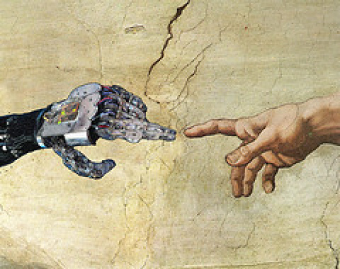The Magic Algorithm Says Your Brand Will Become…
admin, June 11, 2012
He did everything he was supposed to. He sacrificed his free time to study. He was in band, SGA, and helped at a local convalescent home. He got rave reviews from several teachers and the principal of the high school. But, it wasn't enough. A former student of mine didn't get into his 'A-list' school. He got denied, despite paying close attention to the 'algorithms' of the situation.
What happened? Why, though he had it down to a 'science,' did my former student get denied? I don't know the answer. He never found out either. But you know what? It is six years later; the dude's in medical school now. Failed algorithmic realities couldn't outrank his fervor to make his own future.

Today, I read an article in the New York Times about the future of robo-grading. I know some former peers are cheering. They're likely the same teachers who didn't like skimming student papers for writing or logical elements. "That's for the English teacher!" is a far-too-oft philosophy of some.
I get a quasi-upset stomach in thinking of standardized testing as well; but, we need to judge the kids on something. We must rank them somehow…just like your brand's Web pages. Google has built an algorithm, which subjectively objectively judges your page and domain worth… just like some sort of system was weighed upon my former student's future.
"Oh come on, Anthony. We need some sort of system to 'make sense of things.'" Yes, we do. Does more standardized thinking make sense in valuing the information of others? Google thinks so; and, so does particular academics, who champion the notion of statistic wizards hammering out a computer system that can grade papers 'just like' humans.
Recently, a competition took place, asking programmers to engineer a system which would predict the scores of human graders. As mentioned in the article, the system's predictions were very close to the human notions of graders. There's another competition on its way, one that will predict who, based on historical claims data, will be admitted to hospitals in the following year.
The computerized system may become a force within educational circles and districts. Some of the notions seem viable. The computerized system would save teacher time, mark papers, and offer additional assignments…because students are more likely to learn from computerized markings than human ones, correct?

So, this computerized system, is it any different than attempting to learn from particular textbooks, which house graded examples, answers to questions in the back, etc? Why even host a teacher in classrooms altogether? Do you need a marketer? Just adhere to Google's Webmaster guidelines… I mean, the guidelines are written to satisfy an algorithm and not the human spirit, but…
Aren't teachers, in part, supposed to 'market' the learning of their subject matter? Wasn't a part of my job to be an inspiration, a model, a facilitator of learning? Did that human element contribute to the knowledge ascertained? I would like to think so.
But, just like Google, perhaps the 'system' thinks it is more convenient to create algorithms to judge people and their performance, to make them rank a particular way. Perhaps this way we can teach kids to write the 'Penguin' or 'Panda' way.
That's what I want young people to learn, that they are only as good as the algorithm allows them to be, that their human fervor, the human spirit, can be called out like a robotically-demented Babe Ruth; but, this Babe doesn't have time to sign any baseballs, visit sick kids in hospitals, or shake the hands of young fans. This one is just about the 'facts' of the matter.
That's how you would like your marketing progress to go as well, correct? Never mind your consumers and the people element of marketing; an algorithm has your best interests, your best future in mind. But in case that gives you a quasi-upset feeling, there are a few marketers who don't mind staying 'after school' to help explain things to you in human terms…






